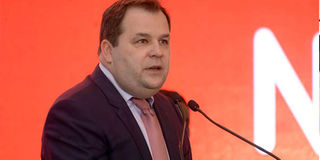KQ debacle calls for radical surgery

Kenya Airways CEO Sebastian Mikosz speaks during a luncheon at Kenya Airways' head office in Embakasi on June 27, 2018. His leadership strategy has contributed to the airline's decline. PHOTO | FILE | NATION MEDIA GROUP
What you need to know:
- The current and major issue that has contributed to the airline’s decline and subsequent losses is its aggressive expansion programme, coupled with internal rifts.
- Stakeholders must hold the board to account for the continued decline of the airline and alleged bias against local managers.
A scrutiny of Kenya Airways reveals its precarious state and highlights its nosediving trajectory that has led to its multi-billion-shilling losses.
When it was separated from the original East African Community in 1977, KQ was incorporated and nationalised as Kenya’s national carrier.
In 1991, a board of directors was appointed to initiate commercialisation in anticipation of its privatisation. The board named a management team to streamline its operations, marketing and finances and, in 1995, KQ entered into a strategic partnership with KLM, Royal Dutch Airlines.
Soon after it made its initial public offering (IPO), KQ experienced significant growth in both fleet and routes.
By 2010, it had attained global airline status, bolstered by its alliance with KLM and Sky Team, and posted commendable profits within two years.
PROCUREMENT
Mismanagement, however, overshadowed these gains, leading to significant losses. These deficiencies may be categorised as preliminary faults and current faults.
In the initial stages post-privatisation, a poor ticketing strategy that offered unreasonably high discounts to travel agents led to heavy losses as revenue streams were potentially lower in comparison with a direct sales approach. As the agents inflated the price of the tickets, customers opted to travel with other airlines.
The private sector is reputed for its efficiency in the procurement of goods and services.
Companies place value on not only quantity, but also quality while objectively securing commodities at competitive market rates that benefit both them and their customers.
But KQ would frequently procure goods and services well above market rates.
The current and major issue that has contributed to the airline’s decline and subsequent losses is its aggressive expansion programme, coupled with internal rifts.
EMPLOYEE SATISFACTION
In 2010, the directors sidelined management in KQ’s purchase of old aircraft from KLM, even though the planning committee had proposed fuel-efficient long-range aeroplanes. The airline subsequently sold the aeroplanes at a loss.
In another misstep, a lease agreement with financiers for 20 aircraft, although it had merit, had suspicious fees amounting to $142 million, which is 12 per cent of KQ’s operating costs, against the global benchmark of five per cent.
Surprisingly, when then-President Daniel arap Moi appointed Philip Ndegwa as executive chairman, KQ demonstrated profitability.
Cognisant of the importance and value of his employees as the key to success, Mr Ndegwa focused on employee satisfaction to maximise productivity.
Mr Ndegwa embarked on clearing arrears and empowering staff and improving their morale, including by pay raises. KQ was privatised and became the “Pride of Africa”.
The government’s and board’s decision to bring in Sebastian Mikosz is, therefore, understandable, having remarkably turned around LOT Polish Airlines.
PAY REDUCTION
But KQ’s continued spiral denotes deficiencies in his strategy, considering low staff morale, premature launch of the US route, and poor logistics analysis.
Staff are key to the success of any organisation. Mr Mikosz’s cost-saving strategy involved an approximate 50 per cent allowance reduction for out-of-station personnel, while retrenching non-essential personnel.
He also attempted to decrease pilots’ salaries to below global competitive rates, but was met with strong opposition from their union.
Mr Mikosz’s premature launch of the daily flight to the US was also poorly planned, especially since the American market has a sales lead time of 12 months.
The notion that he introduced the route with a lead time of less than five months shows inadequate feasibility studies.
Likewise, a poor code share strategy has limited the success of the new route with no solid partners to feed in state passengers destined for Africa to KQ.
ACCOUNTABILITY
The new route needs at least three aircraft for daily flights, additional staff training, increased facilities, flight dispatch rescheduling and so on to meet the demand.
The airline’s occupancy rate stagnated at 35 per cent, which led to a four-per-week flight reduction.
Stakeholders must hold the board to account for the continued decline of the airline and alleged bias against local managers.
The notion that Mr Mikosz enjoyed indemnity despite consistently posting losses over the nearly three-year period is astonishing.
Mr Mikosz and his team of experts should resign as a matter of principle. Kenyans should seek accountability and invest in our flagbearer while cultivating hope in maintaining our global status as the Pride of Africa.
Mr Kisia was the last Town Clerk & CEO of Nairobi. [email protected]





